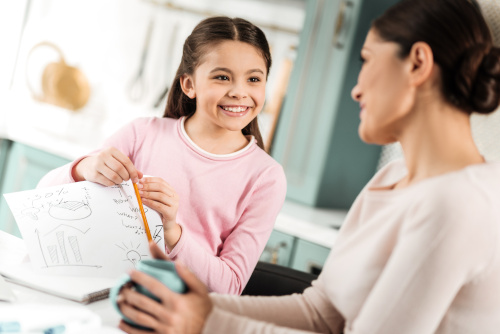Social and emotional skills are vital in both school, and the workplace. They can help children and adults build and maintain healthy relationships, develop a strong sense of self, manage stress, control their emotions, and more.
CASEL™ has defined five competence areas that lead to social and emotional success for children and adults. Those competence areas are Self-Awareness, Self-Management, Social Awareness, Relationship Skills, and Responsible Decision-Making. But many believe there are three additional areas: Optimistic Thinking, Goal-Directed Behavior and Personal Responsibility.
March 11 marks International SEL Day, a day focused on raising awareness of the importance of social and emotional learning (SEL). There are many ways for teachers to incorporate practical strategies into their everyday lessons — on SEL Day and beyond — to help students practice and strengthen their SEL skills. Here are a few that teachers can use with their students on SEL Day, and all year round.
1. SEL Competency: Decision-Making
Strategy: “Pause Power”
Age: Elementary School
This competency is about how we solve problems and make choices that are based on our values, how we accept responsibility for our decisions and their consequences, and how we learn from experience.
Pause Power is a decision-making strategy that has two parts. It begins with identifying what is really important to us and the principles that we want to live our lives by. It might be “telling the truth” or “being a good friend.” You can help students identify what is important, but make sure to focus on what is important to them, not you. Second, help children develop a habit of pausing when they are faced with an important decision to think about what is most important to them and then using those principles to guide their decision. This will help them avoid making impulsive decisions or being overly influenced by peer pressure. If a child’s decision reflects what is important to them, they will feel better about that decision. So, when you see children struggling with a decision, remind them to use their Pause Power. With practice it will become a habit that will help them make decisions based on their values and their true selves.
2. SEL Competency: Personal Responsibility
Strategy “Encourage Before you Correct”
Age: Middle School
A key aspect of Personal Responsibility is perseverance — continuing to work hard and try one’s best until a task is completed or a problem is solved. We can encourage perseverance in our students by helping them identify what strategies or techniques have helped them persevere and be successful in the past and what can be applied to the current situation.
One way to help them do this is to identify an important responsibility that they are good at managing. It might be doing chores without reminders or participating in an extracurricular activity at school. Then have the student write down at least three strategies (for example, keeping an up-to-date calendar or setting reminders on their smartphone) that help them succeed in this area. Discuss the strategies, keep a list of them, and the next time the child is struggling to complete a project or task, review the list and see what proven strategies they can apply to the current challenge.
3. SEL Competency: Self-Management
Strategy: “Psych Yourself Up”
Age: High School
Sometimes we need to calm down and focus; other times we need to “psych ourselves up” to get the energy needed to tackle our schoolwork, our chores, or our jobs. Being able to psych ourselves up so that we can get to work is a life-long skill that helps us be successful. The goal of this strategy is to increase your energy level and motivation to do whatever needs to be done.
Many professional athletes and entertainers have “pre-performance success rituals” that they go through to get ready for the big game or concert. They might listen to the inspiring music, eat a special meal, take deep breaths, or do something silly like when basketball star LeBron James tosses chalk before each game. A good success ritual for high school students is to think about and picture in their minds their past successes — specific times when they performed well and achieved their goals. Remembering their past successes can give them the energy and the confidence to take on their current challenges.
Teachers can have their students create a success ritual and instruct them to practice it at least twice a week (or as often as needed). They can also be encouraged to write a journal entry reflecting on how it makes them feel and whether it helped them achieve their goals. Teachers can offer to have students present about their success rituals to their class, too.
When students are able to strengthen and practice their social and emotional skills, it can have a positive impact on everything from academics to behavior. By focusing on these skills throughout the school year, teachers can help set their students up for success in school — and in life.
- Science teachers, math teachers, history teachers–we’re all reading teachers now - December 20, 2024
- Using AI to teach persuasive writing to English learners - December 20, 2024
- Information literacy is key in the age of AI - December 19, 2024


